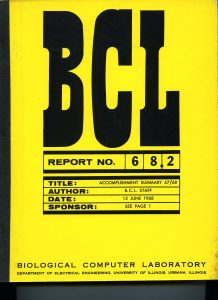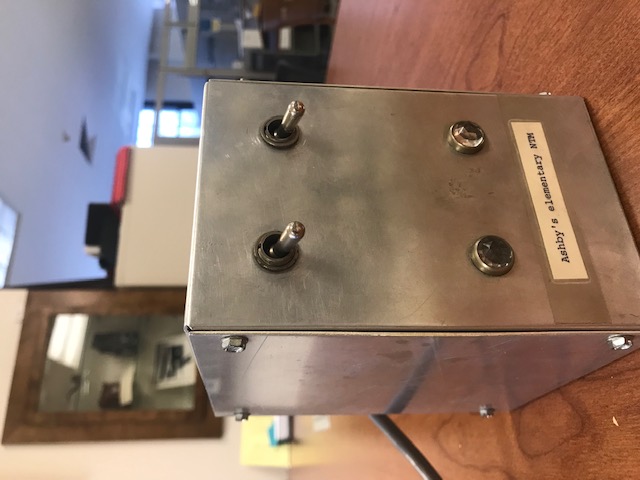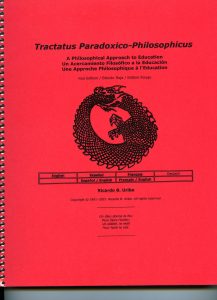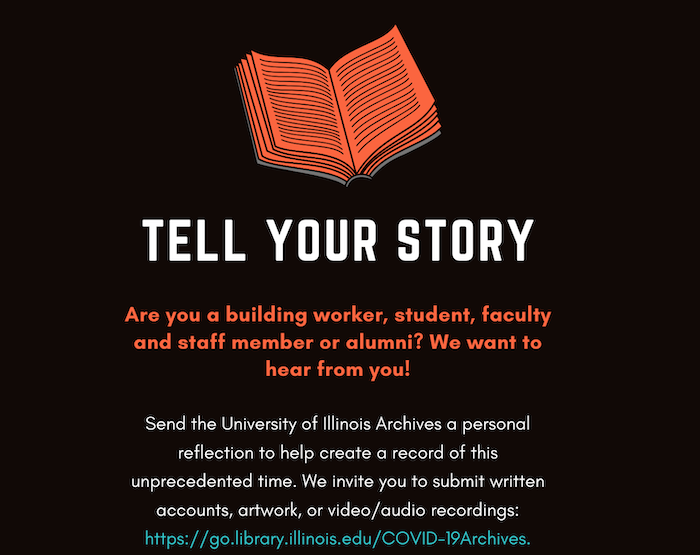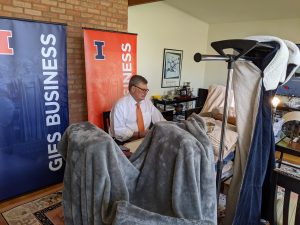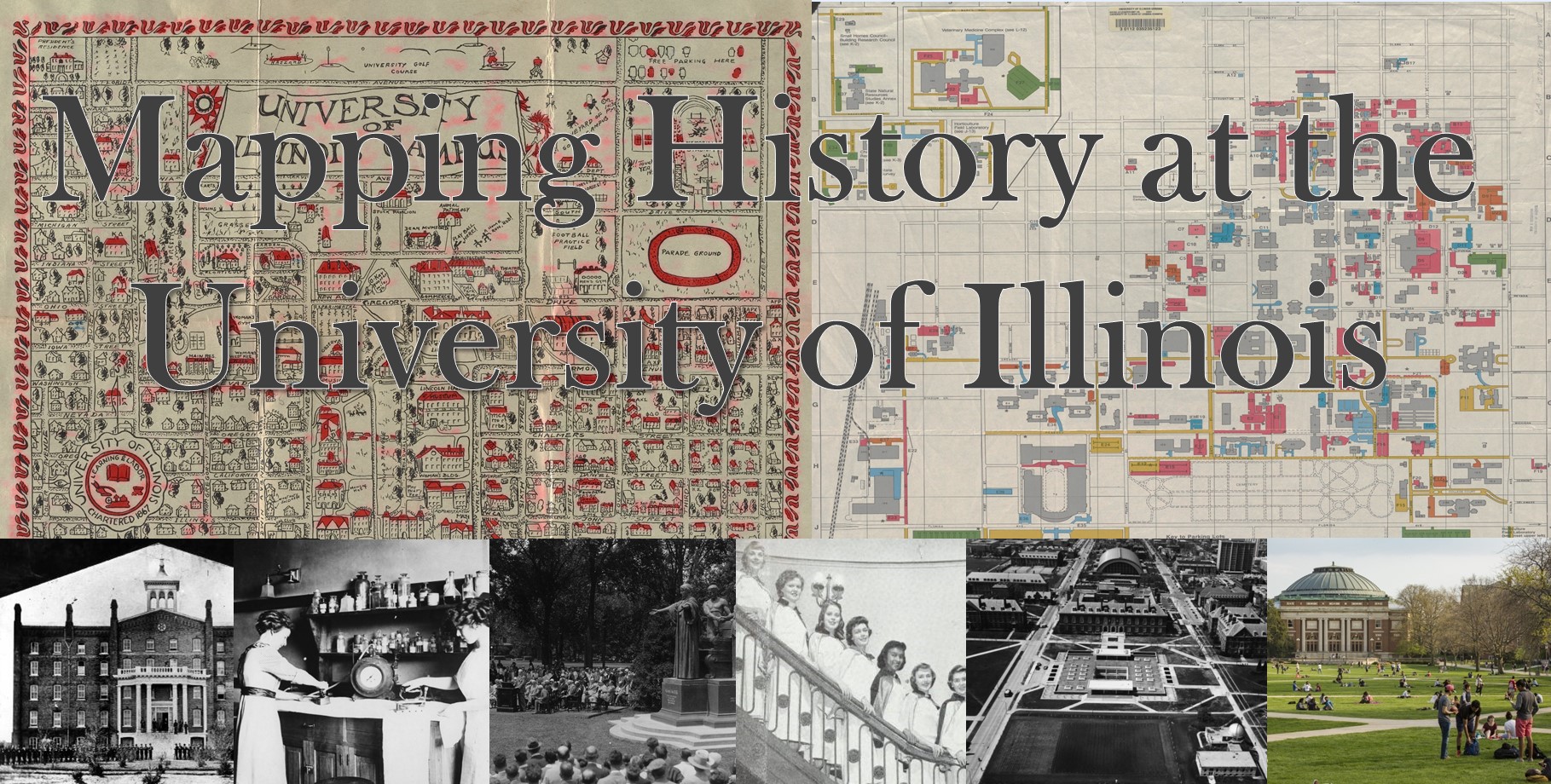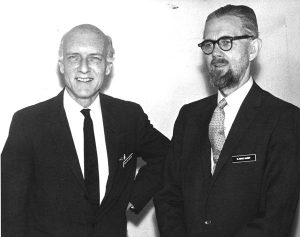Archives staff member Sammi Merritt is leaving for a new position as Electronic Resources and Repository Librarian for the Alaska Resources Library and Information Services (ARLIS ). Sammi has contributed to the University of Illinois Archives in innumerable ways, especially as a part of the Archives reference team and answering numerous reference inquiries (check out one such inquiry to which Sammi responded in this great post Why can’t I find archival material on Google?).
We interviewed Sammi about her experiences working in the Archives and about her new role. We will greatly miss her and wish her the best in her new adventure!
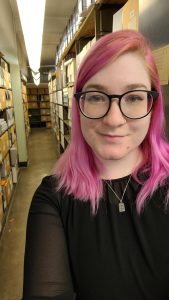
How did you “end up” at the University of Illinois Archives? Tell us about your background.
My path to the Archives was not always straightforward, but so far, I’ve been pleased with my trajectory. Initially an art student in college, I stepped away after earning my AA and got a certificate in web development from a technical school. After a couple years of web development work, I decided to return to college to finish my BA degree. I earned my BA in History at Florida Gulf Coast University with minors in Medieval Studies and Art History, with the goal of eventually working in a field where I could work with medieval manuscripts and artifacts, conducting research on a daily basis.
During my studies, I learned about careers in archives through two encounters. In my final summer as an undergrad, I attended a field school for Conservation of Historic Book Bindings in San Gemini, Italy, where I hoped to get hands-on experience working with historic books (especially medieval ones). In this course, I met many students who were already working towards an MLIS degree (or planning on it). I also learned that an MLIS could be a viable path towards a career in cultural heritage and was encouraged by my classmates to look into this route, given my passion for documentary evidence as a whole. In the following semester, I had the opportunity to intern at a local history museum, processing a collection of ephemera in their archives. The tangible connection between the documents in my hands and the local past was a powerful experience which made me feel much more connected to the history around me. This is where I started to understand the impact that archives and local history can have on a community, and where I decided I would pursue the MLIS route for my career.
I attended the University of Illinois, Urbana-Champaign to earn my MS in Library and Information Science alongside an MA in History, continuing to focus my studies on medieval history, but also on archives, museums, and special collections more broadly. During my time as a graduate student, I had the amazing opportunity to work as a graduate assistant at the University Archives, where I spent most of my time processing physical material until the pandemic struck. Amidst the pandemic, I helped with reference, built some digital tools to facilitate administrative tasks online, and worked on remote processing projects.
Once I graduated with my master’s degrees, I applied for the position that I am in now, as part of the reference team at the University Archives. Working more closely with the many researchers who contact us daily, I’ve learned a great deal about how archives operate and how people tend to use or encounter archives, which have in turned informed my reference outlooks and strategies.
What did you do in the Archives? Describe a typical day.
As part of the reference team at the University Archives’ Main Library location, my main job is to provide access to the material in our holdings. Most days, this means that I receive and respond to inquiries from our researchers – ranging from scheduling visits and retrieving boxes, to leading instruction sessions for classes visiting the Archives, to performing in-depth research to answer questions sent in remotely.
While people from all professions and walks of life find themselves using archives on occasion, the searching strategies and background knowledge needed to effectively find your way through archival material tend to be quite specialized. Having someone like me (and my other reference colleagues) at the ready to guide researchers through the searching and retrieval process, as well as offer helpful suggestions for where to begin (or continue) your research, can make the difference between a successful or an unsuccessful research trip. For this reason I’ve taken this role as a facilitator quite seriously.
At the same time, I am also a historian at heart, and I can’t help but get entangled in the web of a research question when a juicy one comes along. When time permits, I also conduct my own research into some of the burning questions that arise from looking through our holdings, and write up blog posts with my findings.
What is one of your most interesting/strange/fun research questions?
It would be quite difficult for me to pick just one question as my favorite/most interesting/most strange research question I have received; we get many questions every week, and there’s at least one that catches my interest almost every day.
The questions that stick with me the most, however, are the ones that are left unanswered. I recall one question about a massive collection of papyrus fragments which used to be held at the university, called the American Center of the International Photographic Archives of Papyri. The researcher wanted to know what records we had of the Center’s existence, and I was only able to find some tangential references to the project scattered throughout the Archives; no conclusive answers to any of the who, what, when, why, how questions that I would have liked to find. Another one that haunts me is a question about the fate of the Artist’s Studio “Peep Show” models created by Lorado Taft. The Archives has records of these in Taft’s papers, and I was able to find that they were eventually transferred to the World Heritage Museum on campus, but the Museum had no records of them when the researcher followed up.
I also have a bit of a penchant for finding documentary evidence to back up (or discount) local legends – I had a great time researching the question of the legendary bulldozer beneath the Memorial Stadium (spoiler alert: there isn’t one), and I’ve recently addressed a long-burning question of my own about whether the legend of the ghost in the English Building had any basis in reality.
On behalf of our researchers, I’ve investigated topics such as the cause of death of Avery Brundage, the age and origin of the trees on campus, the provenance of a dubiously-recorded donation of records and books about prisons from the early-twentieth century, the origin of the flea-flicker football play, genealogical inquiries about far-removed family members, the history of the telephone on campus, and much, much more. The uniqueness of each research question and the thrill of the hunt for extant documents which answer the question effectively has been my favorite part of this job, and I will sorely miss this aspect of working with special collections as I move into the next chapter of my career.
Tell us about your new adventure in Alaska?
I will be taking a full-time faculty position as Electronic Resources and Repository Librarian for the Alaska Resources Library and Information Services (ARLIS). The ARLIS Library is a special collection in its own right, being a consolidation of the libraries for several natural resources departments in the state of Alaska, such as the Bureau of Land Management and the Fish and Wildlife Department. This position will focus on improving access to electronic resources for the library, such as the collections catalog and the e-journal subscriptions.
How has your experience at the University of Illinois and in the Archives prepared you for your new job?
As both a reference archivist and a long-time web developer, my skills in searching and analyzing information as well as understanding usability and accessibility are going to be put to good use in this new role. The existing catalog limits the findability of many of the ARLIS materials, and while current research needs are largely remote, online access to the collections is sparse at the moment. Additionally, there is plenty of material that still needs to be processed and cataloged, including a fair amount of archival material, so I have no doubts that my four years in the University Archives will have left me with the experience I need to help properly create access points for those.
Working in and with archives requires experience in interpreting primary source documents, compiling information from a range of diverse sources, and creative problem solving, all of which will be valuable to me as I work on improving access to the electronic resources as part of the ARLIS collections. Fortunately for me, this job also entails participating in the reference workload, so I’ll have a whole new set of collections to learn and new questions to investigate daily. I will miss the University Archives, but new adventures await!
